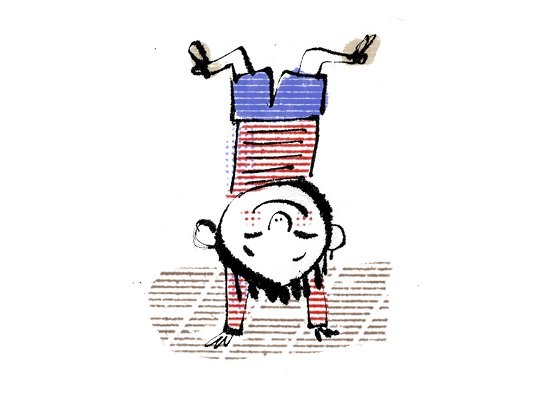Mikhail Zoshchenko was born on August 9, 1894 in St. Petersburg.
On a summer July day in St. Petersburg, on the St. Petersburg side, in house number 4 on Bolshaya Raznochinnaya Street, in the family of the Itinerant artist Mikhail Ivanovich Zoshchenko and actress Elena Iosifovna Surina, who managed to write and publish stories from the lives of poor people in the magazine "Kopeyka" while doing household chores. , a boy was born. In the metric book of the Church of the Holy Martyr Queen Alexandra, he was entered as Mikhail Mikhailovich Zoshchenko. In total, the Zoshchenko family had eight children.
In 1903, the parents sent the boy to the St. Petersburg Eighth Gymnasium. Here is how Zoshchenko spoke about these years in his “Autobiography”: “I studied very poorly. And especially poorly in Russian - at the matriculation exam I received a unit in Russian composition... This failure... is even more strange to me now because I already wanted to to be a writer and wrote stories and poems for myself. More out of rage than out of despair, I tried to end my life."
In 1913, after graduating from high school, future writer entered Faculty of Law St. Petersburg Imperial University, from where he was expelled a year later due to non-payment of tuition. The young man had to go to work. His first position was controller at the Caucasian railway. But soon the first World War interrupted the usual course of life, and Zoshchenko decided to go into military service.
He was first enlisted as a private cadet in Pavlovskoe military school as a volunteer of the 1st category, and then, after completing accelerated four-month wartime courses, he went to the front. He himself explained it this way: “As far as I remember, I did not have a patriotic mood - I simply could not sit in one place.” Nevertheless, he distinguished himself greatly in his service: he took part in many battles, was wounded, and was poisoned by gases. Having begun to fight with the rank of ensign, Mikhail Zoshchenko was transferred to the reserve (due to the consequences of gas poisoning) and awarded four orders for military merits.
For some time, the writer’s fate was connected with Arkhangelsk, where he arrived in early October 1917. After February Revolution Zoshchenko was appointed head of posts and telegraphs and commandant of the Main Post Office. Then, during a business trip to Arkhangelsk, there followed an appointment as an adjutant of the squad, and elections to the secretary of the regimental court. He combined public service with literary experiments: writing at that time had not yet become his main occupation. Influenced by fashionable people in the capital youth environment writers - Artsybashev, Verbitskaya, Al. Kamensky - he wrote the stories "Actress", "Philistine" and "Neighbor".
But peaceful life and literary exercises were interrupted again - this time by the revolution and the Civil War. He went to the front again, at the end of January 1919, volunteering for the Red Army. Zoshchenko served in the 1st Exemplary Regiment of the Village Poor as a regimental adjutant. He took part in the battles near Narva and Yamburg against the detachments of Bulak-Balakhovich. However, after a heart attack, he had to demobilize and return to Petrograd.
IN State Archives Arkhangelsk region Documents about Mikhail Zoshchenko have been partially preserved. From them you can find out that he, with the rank of staff captain, was enrolled in the lists of the 14th foot squad. The military personnel carried out guard duty in the city, guarded warehouses, unloaded weapons and food in Bakaritsa and Economy.
Journalist L. Gendlin heard from Zoshchenko the story of his life in the region permafrost. He liked the simple-minded Pomors. In Mezen, Zoshchenko met Lada Krestyannikova, whose husband had gone missing at sea. Lada did not believe in his death and waited. Zoshchenko asked Lada to share his loneliness with him. But Lada said: “What will happen then? The delight of the first nights will pass, routine will set in, you will be drawn to Petrograd or Moscow.” But Zoshchenko could not take his eyes off this woman - he liked her gait, her melodious figurative speech, and the way she cleaned, washed, cooked. She did not complain about fate, did not grumble, she did everything easily and with pleasure. When the children fell asleep, she picked up an old guitar and sang old songs and romances. Mikhail Mikhailovich could not understand where she got her strength from. Lada's father was a priest in Pskov, who was shot with his wife by the Bolsheviks in Kronstadt. And Lada and her three sons were exiled to Arkhangelsk.
There was something about Mikhail Zoshchenko’s appearance and demeanor that drove many women crazy. He did not look like the fatal movie beauties, but his face, according to friends, seemed illuminated by an exotic sunset - the writer claimed that he traced his origins to an Italian architect who worked in Russia and Ukraine. According to Daniil Granin, the writer’s narrow, dark face attracted him with some kind of old-fashioned male beauty. A small mouth with white, even teeth rarely formed a soft smile. He had dark brown, thoughtful eyes and small hands. The hair was combed into an impeccable parting. His appearance combined delicacy and firmness, sorrow and isolation. He moved slowly and carefully, as if afraid of splashing himself. His decorum and coolness could be mistaken for arrogance, and even challenge.
Returning to Petrograd, Zoshchenko met his future wife, Vera Vladimirovna Kerbits-Kerbitskaya.
Vera Vladimirovna Zoshchenko recalled: “I remember the end of the 18th year... Mikhail came from the front civil war... He came to me... He loved me very much then... He came for the first time in felt boots, in a short jacket, altered with his own hands from an officer's overcoat... The stove was burning, he stood leaning against it, and I asked: - What is the most important thing in life for you? - I, of course, expected that he would answer: - Of course, you! But he said, “Of course, my literature!” This was in December 1918. And it was like that all my life."
From 1918 to 1921, Mikhail Zoshchenko changed many occupations, which he wrote about later: “I changed ten or twelve professions before getting to my current profession. I was a criminal investigation agent... an instructor in rabbit breeding and chicken breeding... a policeman... I learned two trades - shoemaking and carpentry... my last profession before writing was clerical work."
At the same time, the aspiring writer attended the literary studio at the publishing house " World literature", where Korney Chukovsky conducted seminars. It was there that he met Gumilyov, Zamyatin, Shklovsky, Lunts, Slonimsky, Posner, Polonskaya and Gruzdev. In the studio, Mikhail began to polish his individual style, thanks to which his works gained enormous popularity. In January 1920, the writer experienced the death of his mother. That same year, in July, he married V.V. Kerbits-Kerbitskaya and moved in with her.
In 1921 it appeared literary group“Serapion Brothers”, which Zoshchenko also joined. Together with Slonimsky, he was part of the so-called “central” faction, which adhered to the belief that “current prose is no good” and that we must learn from the old forgotten Russian tradition - Pushkin, Gogol and Lermontov.
In May 1922, a son, Valery, was born into the Zoshchenko family, and in August of the same year, the first almanac “The Serapion Brothers” was published by the Alkonost publishing house, where a story by Mikhail Zoshchenko was published. The young writer’s first independent publication was the book “Nazar Ilyich’s Stories by Mr. Sinebryukhov,” published in a circulation of 2,000 copies by the Erato publishing house.
Maxim Gorky was on friendly terms with the “serapions”; he followed the work of each of them. Here is his review of Mikhail: “Zoshchenko recorded it superbly. His latest works are the best that the Serapions had. A subtle writer. A wonderful humorist.” Gorky began to patronize the talented writer and assisted him in every possible way in the publication of his works. Through the mediation of a proletarian writer, Zoshchenko’s story “Victoria Kazimirovna” was published in the Belgian magazine “Le disque vert” in 1923. French. This seemingly insignificant event could not have been mentioned, but this story became the first translation of Soviet prose published in Western Europe.
In general, this decade in Zoshchenko’s work is characterized by extraordinary creative activity. Between 1929 and 1932, a collection of his works was published in six volumes. In total, from 1922 to 1946, there were 91 editions and reprints of his books.
In 1927 large group writers united by the Krug publishing house, created a collective declaration in which they highlighted their literary and aesthetic position. Zoshchenko was among those who signed it. At this time, he was published in periodicals (mainly in the satirical magazines “Behemoth”, “Smekhach”, “Buzoter”, “Crank”, “The Inspector General”, “Mukhomor”, etc.). But not everything was smooth in his life. In June 1927, an issue of the Behemoth magazine was confiscated because of the “politically harmful” story by Mikhail Zoshchenko, “An Unpleasant History.” There was a gradual liquidation of this kind of publications, and in 1930 the last satirical magazine “The Inspector General” was closed in Leningrad.
But Mikhail Zoshchenko did not despair. He continued to work. In the same year, he and a team of writers were sent to the Baltic shipyard. There he wrote for the wall and workshop newspapers, and was also published in the factory's large-circulation newspaper "Baltiets". Since 1932, the writer began collaborating with the magazine "Crocodile", collected material for the story "Youth Restored", and studied literature on physiology, psychoanalysis, and medicine.
Mikhail Zoshchenko (center) in the circle of Leningrad writers. 1930s.
The first terrible shock in Zoshchenko's life was gas poisoning during the war. Second no less severe shock There was a meeting at a distant camp point with Lada - dirty, in a padded jacket with holes. He asked about her sons. She replied that she knew nothing about their fate. Returning home, Zoshchenko sent her a parcel with warm clothes and food. He wanted to write a story about a female camp worker, using Lada as a prototype, but nothing came of this plan.
By this time his works were well known in the West. But this fame also had back side: in 1933 in Germany, his books were subjected to a public auto-da-fé in accordance with Hitler's "black list". In the USSR, his comedy " Cultural heritage". In 1934, one of the most famous books Zoshchenko - “The Blue Book”, the idea of which was suggested by Gorky: “with colorful beads... to depict and embroider something like a humorous history of culture.” In it, the author humorously plays on famous literary subjects ("Poor Lisa", "Suffering young Werther", "Cunning and Love", etc.)
In addition to plays, short stories and novellas, Zoshchenko continued to write feuilletons, historical stories ("The Black Prince", "Retribution", "Kerensky", "Taras Shevchenko", etc.), stories for children ("Christmas Tree", "Granny's Gift", "Smart Animals", etc.). From August 17 to September 1, 1934, the First All-Union Congress took place Soviet writers, whose board member Mikhail Zoshchenko was elected.
At first sight creative destiny the writer's life was going well, but throughout literary path he was subjected to severe and often impartial criticism. From time to time he resorted to the services of psychotherapists. Even after 1939, when he was awarded the Order of the Red Banner of Labor, his works constantly became the target of official criticism.
At the beginning of the Great Patriotic Mikhail Zoshchenko wrote an application asking to enlist in the Red Army, but was refused as unfit for duty. military service and took up anti-fascist activities outside the battlefield: he wrote anti-war feuilletons for newspapers and the Radio Committee. In October 1941, the writer was evacuated to Alma-Ata, and in November he was enrolled as an employee of the script department of the Mosfilm studio. In 1943, he was called to Moscow, where he was offered the position of executive editor of Krokodil, which he refused. However, he was included in the editorial board of the magazine. Everything looked outwardly fine. But the clouds continued to thicken over Zoshchenko’s head. In early December, the Central Committee of the All-Union Communist Party of Bolsheviks adopted two resolutions in a row - “On increasing the responsibility of secretaries of literary and artistic magazines” and “On control over literary and artistic magazines”, where the story “Before Sunrise” was declared “a politically harmful and anti-artistic work” . At an extended meeting of the SSP, A. Fadeev, L. Kirpotin, S. Marshak, L. Sobolev, V. Shklovsky and others spoke out against Zoshchenko. He was supported by D. Shostakovich, M. Slonimsky, A. Mariengof, A. Raikin, A. Vertinsky, B. Babochkin, V. Gorbatov, A. Kruchenykh. In the end, the writer was removed from the editorial board of the magazine, deprived of food rations, and evicted from the Moscow Hotel. The persecution continued. At the expanded plenum of the SSP, N.S. Tikhonov also attacked the story “Before Sunrise,” after which, during a personal conversation with Mikhail Mikhailovich, he justified himself by saying that he was “ordered” to do it. Now Zoshchenko was almost never published, but was still awarded the medal “For Valiant Labor in the Great Patriotic War.” Patriotic War 1941-1945.", and in 1946 they were introduced to the editorial board of the magazine "Zvezda". The apotheosis of all the vicissitudes was the resolution of the Central Committee of the All-Union Communist Party of Bolsheviks of August 14, 1946 "On the magazines "Zvezda" and "Leningrad", after which the writer was expelled from the Writers' Union and was deprived of a food "work" card. The reason for the attacks this time was completely insignificant - children's story"The Adventures of a Monkey."
Writer Daniil Granin attended a meeting of the Presidium of the Union of Soviet Writers on the issue of the party resolution on the magazines "Zvezda" and "Leningrad". He remembered how steadfastly Mikhail Zoshchenko stood. Many years later, he tried to find a transcript of Zoshchenko’s speech in the archives, but it was nowhere to be found. It was listed, but it wasn’t there. She was seized. When, by whom - unknown. Obviously, someone thought the document was so outrageous or dangerous that it should not have been kept in the archives. Copies could not be found anywhere either. Granin told a stenographer he knew about this. She shrugged her shoulders: it’s unlikely that any of the stenographers made a copy for themselves, it’s not supposed to, especially in those years this was strictly observed. Two months later she called Granin and asked him to come. When he arrived, without explaining anything, she handed him a stack of typewritten sheets. This was the same transcript of Mikhail Mikhailovich’s speech. Where? How? From the stenographer who worked at that meeting. We managed to find her. The stenographers know each other well. A note was attached to the transcript: “Sorry that this recording is approximate in places, I was very worried at the time, and tears got in the way.” There was no signature.
This woman, who did not know Zoshchenko personally but had read his works, showed true heroism: sitting on the side of the stage, at a small table, she could not raise her eyes to Zoshchenko and understand what was happening. And, however, she understood better than many that Zoshchenko was not a fleeting phenomenon, that his speech should not be lost, she made a copy for herself and kept it all the years.
Following this decision, all publishing houses, magazines and theaters terminated previously concluded contracts and demanded the return of advances issued. The writer's family was forced to subsist on the money raised from selling things, and he himself tried to earn money in a shoemaking artel. In the end, ration card They returned it to him, and he even managed to publish some stories and feuilletons. But he had to earn a living as a translator. Zoshchenko's translation into Russian included the works "Behind the Matches" and "Resurrected from the Dead" by M. Lassil, "From Karelia to the Carpathians" by A. Timonen, and "The Tale of the Collective Farm Carpenter Sago" by M. Tsagaraev. The translator's name was missing. Evgeny Schwartz wrote about Zoshchenko: “In his texts, he reflected (reinforced) his way of living, communicating with the madness that was beginning to happen around him.”
Zoshchenko was endowed with absolute pitch and a brilliant memory. Over the years spent in the midst of people, he managed to penetrate the secret of their conversational structure, managed to adopt the intonation of their speech, their expressions, turns of phrase, words - he studied this language to the subtleties and from the first steps in literature began to use it easily and naturally, as if this language was his own, blood-borne, absorbed with his mother’s milk. Reading Zoshchenko's stories syllable by syllable, the novice reader thought that the author was one of his own, living a simple life like himself, a simple person, like “ten of them on each tram.”
Literally everything in the writer’s writings told him this. And the place where the story of the next story “unfolded”; the apartment, the kitchen, the bathhouse, the same tram - everything is so familiar, personal, everyday familiar. And the “story” itself: a fight in a communal apartment over a scarce hedgehog, nonsense with paper numbers in a bathhouse for a dime, an incident on transport when a passenger’s suitcase was “stolen” - the author seems to stick out behind the person’s back; He sees everything, he knows everything, but he is not proud - well, I know, but you don’t - he does not rise above those around him. And the main thing is that he writes “competently”, does not play smart, everything is purely Russian, “natural, understandable words.”
This last completely reassured the reader. In anything else, but here - whether a person really knows how to talk in a simple way or is just playing along - he will always figure it out. And he figured it out: Zoshchenko is positively his own, there is no catch here. The centuries-old distrust of the “poor” person towards those standing higher on the social ladder received here one of its most noticeable holes. This man believed the writer. And this was Zoshchenko’s great literary achievement.
If he had not been able to speak the language of the masses, readers would not know such a writer today.
Many writers have traveled the path from “adult” to children’s literature. Adult writer Mikhail Zoshchenko (1894–1958) also took up his special place in children's literature. From 1937 to 1945 he wrote for children. Children fell in love with the unique humor and edification combined in his stories. M. Zoshchenko’s stories are still read with pleasure today. Probably, the writer was able to penetrate into the children's worldview and talk to the little reader in interesting language. This book contains his stories from three cycles “Smart Animals,” “Cunning and Smart,” “Lelya and Minka.” Stories by M. Zoshchenko are included in compulsory reading programs in elementary schools.
For primary school age.
Mikhail Zoshchenko
Stories
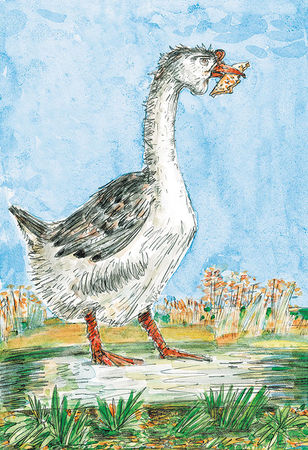
Smart animals
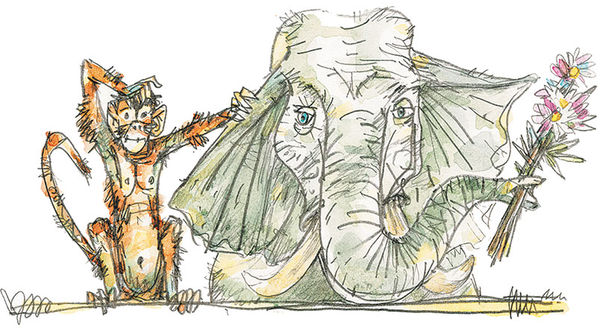
They say that elephants and monkeys are very smart animals. But other animals are not stupid either. Look what smart animals I saw.
Smart goose
One goose was walking in the yard and found a dry crust of bread.
So the goose began to peck at this crust with its beak in order to break it and eat it. But the crust was very dry. And the goose could not break it. But the goose didn’t dare swallow the whole crust right away, because it probably wouldn’t be good for the goose’s health.
Then I wanted to break this crust so that it would be easier for the goose to eat. But the goose did not allow me to touch its crust. He probably thought that I wanted to eat it myself.
Then I stepped aside and watched what would happen next.
Suddenly the goose takes this crust with its beak and goes to the puddle. He puts this crust in the puddle. The crust is made soft in water. And then the goose eats it with pleasure.
Smart chicken
One hen was walking in the yard with chickens. She has nine little chicks.
Suddenly a shaggy dog came running from somewhere.
This dog crept up to the chickens and grabbed one.
Kura was also very scared at first and ran. But then she looks - what a scandal: the dog is holding her little chicken in its teeth.
And he probably dreams of eating it.
Then the chicken boldly ran up to the dog. She jumped up a little and gave the dog a painful peck right in the eye.

The dog even opened his mouth in surprise.
And she released the chicken. And he immediately ran away quickly. And the dog looked to see who pecked her in the eye. And, seeing the chicken, she became angry and rushed at it. But then the owner ran up, grabbed the dog by the collar and took it away with him.
And the chicken, as if nothing had happened, collected all her chickens, counted them and began to walk around the yard again.
Stupid thief and smart pig
Our owner had a pig at his dacha.
And the owner locked this piglet in the barn at night so that no one would steal it.
But one thief still wanted to steal this pig.
He broke the lock at night and made his way into the barn.
And piglets always squeal very loudly when they are picked up. Therefore, the thief took the blanket with him.
And just as the pig wanted to squeal, the thief quickly wrapped him in a blanket and quietly walked out of the barn with him.
Here is a piglet squealing and floundering in a blanket. But the owners do not hear his screams, because it was a thick blanket. And the thief wrapped the pig very tightly.
Suddenly the thief feels that the pig is no longer moving in the blanket. And he stopped screaming.
And lies without any movement.
The thief thinks:
"Maybe I wrapped the blanket around him really tight. And maybe the poor little pig suffocated in there."
The thief quickly unfolded the blanket to see what was wrong with the piglet, and the piglet jumped out of his hands, squealed, and rushed to the side.
© Zoshchenko M. M., heirs, 2009
© Andreev A. S., illustrations, 2011
© AST Publishing House LLC, 2014
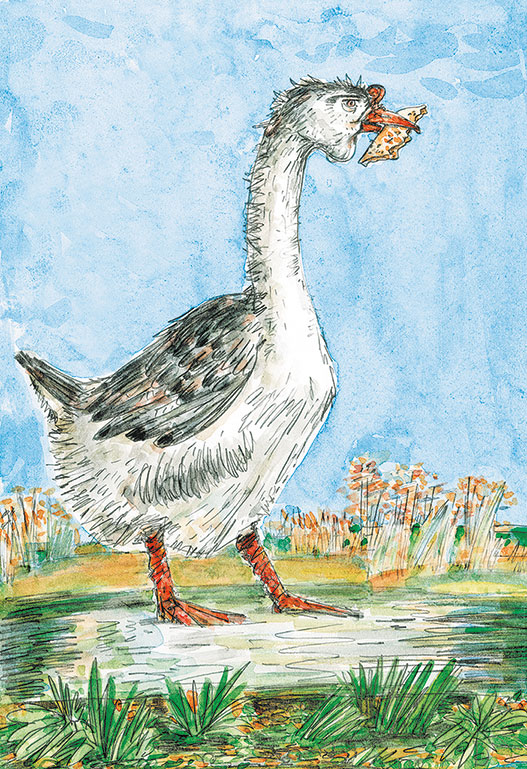
Smart animals
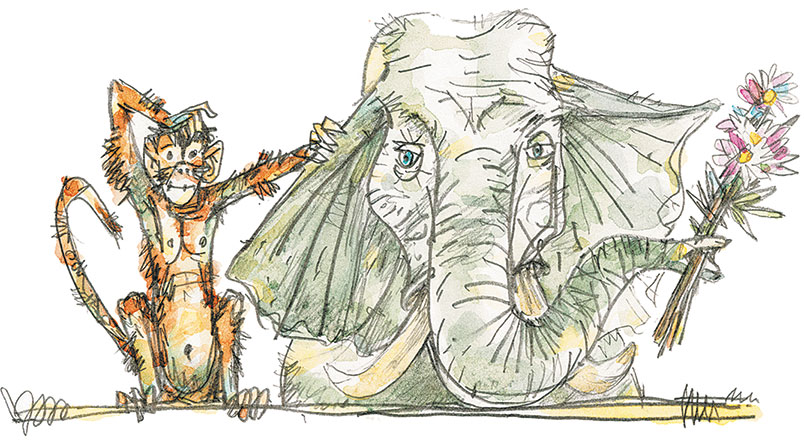
They say that elephants and monkeys are very smart animals. But other animals are not stupid either. Look what smart animals I saw.
Smart goose
One goose was walking in the yard and found a dry crust of bread.
So the goose began to peck at this crust with its beak in order to break it and eat it. But the crust was very dry. And the goose could not break it. But the goose didn’t dare swallow the whole crust right away, because it probably wouldn’t be good for the goose’s health.
Then I wanted to break this crust so that it would be easier for the goose to eat. But the goose did not allow me to touch its crust. He probably thought that I wanted to eat it myself.
Then I stepped aside and watched what would happen next.
Suddenly the goose takes this crust with its beak and goes to the puddle. He puts this crust in the puddle. The crust is made soft in water. And then the goose eats it with pleasure.
It was a smart goose. But the fact that he didn't let me break the crust shows that he wasn't all that smart. Not exactly a fool, but he was still a little behind in his mental development.
Smart chicken
One hen was walking in the yard with chickens. She has nine little chicks.
Suddenly a shaggy dog came running from somewhere.
This dog crept up to the chickens and grabbed one.
Then all the other chickens got scared and scattered.
Kura was also very scared at first and ran. But then she looks - what a scandal: the dog is holding her little chicken in its teeth.
And he probably dreams of eating it.
Then the chicken boldly ran up to the dog. She jumped up a little and gave the dog a painful peck right in the eye.

The dog even opened his mouth in surprise.
And she released the chicken. And he immediately ran away quickly. And the dog looked to see who pecked her in the eye. And, seeing the chicken, she became angry and rushed at it. But then the owner ran up, grabbed the dog by the collar and took it away with him.
And the chicken, as if nothing had happened, collected all her chickens, counted them and began to walk around the yard again.
It was a very smart chicken.
Stupid thief and smart pig
Our owner had a pig at his dacha.
And the owner locked this piglet in the barn at night so that no one would steal it.
But one thief still wanted to steal this pig.
He broke the lock at night and made his way into the barn.
And piglets always squeal very loudly when they are picked up. Therefore, the thief took the blanket with him.
And just as the pig wanted to squeal, the thief quickly wrapped him in a blanket and quietly walked out of the barn with him.
Here is a piglet squealing and floundering in a blanket. But the owners do not hear his screams, because it was a thick blanket. And the thief wrapped the pig very tightly.
Suddenly the thief feels that the pig is no longer moving in the blanket. And he stopped screaming.
And lies without any movement.
The thief thinks:
“I may have wrapped the blanket around him really tight. And maybe the poor little pig suffocated there.”
The thief quickly unfolded the blanket to see what was wrong with the piglet, and the piglet jumped out of his hands, squealed, and rushed to the side.
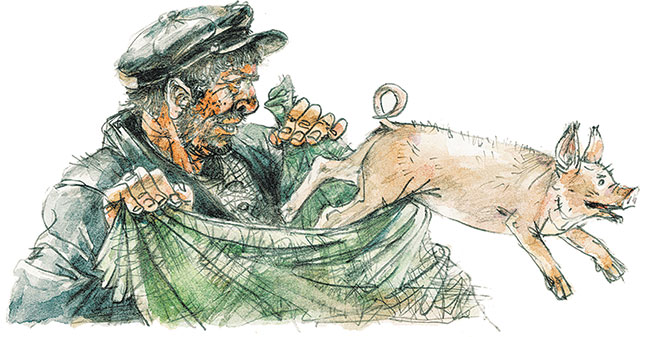
Then the owners came running. The thief was captured.
Thief says:
- Oh, what a pig this cunning piglet is. He probably pretended to be dead on purpose so that I would let him out. Or maybe he fainted from fear.
The owner says to the thief:
- No, my pig didn’t faint, but he deliberately pretended to be dead so that you would untie the blanket. This is a very smart pig, thanks to which we caught the thief.
Very smart horse
Besides the goose, chicken and pig, I saw a lot of smart animals. And I’ll tell you about this later.
In the meantime, I need to say a few words about smart horses.
Dogs eat boiled meat.
Cats drink milk and eat birds. Cows eat grass. Bulls also eat grass and gore people. Tigers, those cheeky animals, eat raw meat. Monkeys eat nuts and apples. Chickens peck crumbs and various debris.
Tell me, please, what does the horse eat?
The horse eats the same healthy food that children eat.
Horses eat oats. And oats are oatmeal and rolled oats.
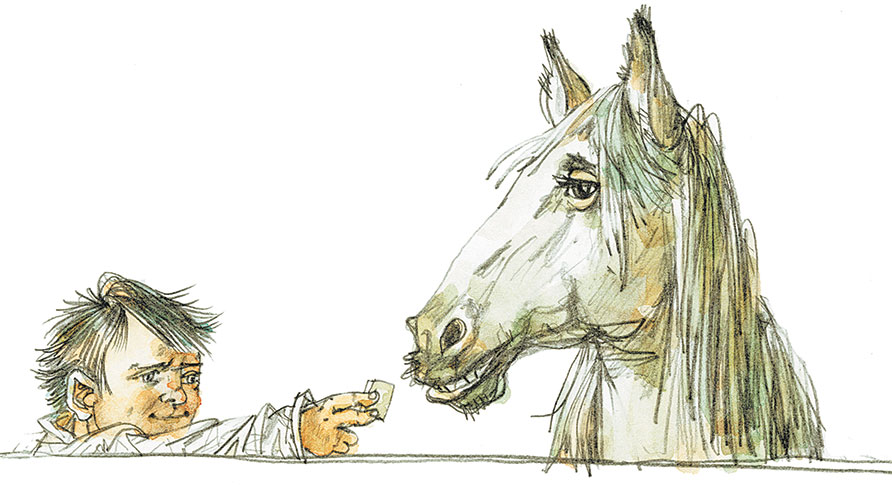
And children eat oatmeal and rolled oats and thanks to this they become strong, healthy and brave.
No, horses are not stupid for eating oats.
Horses are very smart animals because they eat such a healthy baby food. In addition, horses love sugar, which also shows that they are not stupid.
Smart bird
One boy was walking in the forest and found a nest.
And in the nest sat tiny naked chicks. And they squeaked.
They were probably waiting for their mother to fly in and feed them worms and flies.
The boy was glad that he had found such nice chicks, and wanted to take one to bring him home.
As soon as he extended his hand to the chicks, suddenly some feathered bird fell from the tree like a stone at his feet.
She fell and lies in the grass.
The boy wanted to grab this bird, but it jumped a little, hopped on the ground and ran away to the side.
Then the boy ran after her. “Probably,” he thinks, “this bird hurt its wing, and that’s why it can’t fly.”
As soon as the boy approached this bird, it jumped again, jumped on the ground and again ran away a little.
The boy follows her again. The bird flew up a little and sat down in the grass again.
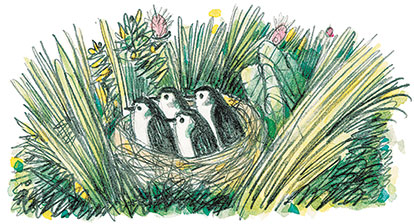
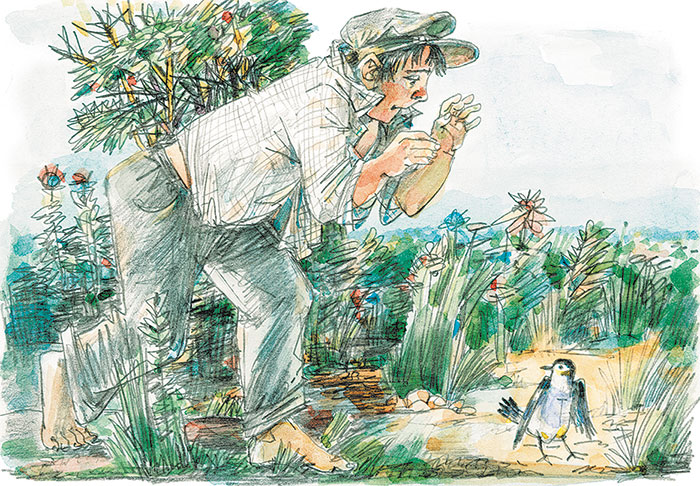
Then the boy took off his hat and wanted to cover the bird with this hat.
As soon as he ran up to her, she suddenly fluttered up and flew away.
The boy was really angry with this bird.
And he quickly went back to take at least one chick.
And suddenly the boy sees that he has lost the place where the nest was, and cannot find it.
Then the boy realized that this bird had deliberately fallen from the tree and was deliberately running on the ground in order to take the boy away from its nest.
So the boy never found the chick.
He picked a few wild strawberries, ate them and went home.
Clever dog
I had a big dog. Her name was Jim.
It was a very expensive dog. It cost three hundred rubles.
And in the summer, when I was living at the dacha, some thieves stole this dog from me. They lured her with meat and took her away with them.
So I searched and searched for this dog and couldn’t find it anywhere.
And then one day I came to the city to my city apartment. And I’m sitting there, grieving that I lost such a wonderful dog.
Suddenly I heard someone on the stairs call.
I open the door. And you can imagine - my dog is sitting in front of me on the platform.
And some top tenant says to me:
- Oh, what a smart dog you have - she just called herself. She nuzzled the electric bell and called for you to open the door for her.

It's a shame that dogs can't talk.
Otherwise she would have told who stole it and how she got into the city. The thieves probably brought it by train to Leningrad and wanted to sell it there. But she ran away from them and probably ran through the streets for a long time until she found her familiar house, where she lived in the winter.
Then she climbed the stairs to the fourth floor. She lay at our door. Then she saw that no one opened it for her, so she took it and called.
Oh, I was very happy that my dog was found, I kissed her and bought her a big piece of meat.
Relatively smart cat
One housewife left on business and forgot that she had a cat in the kitchen.
And the cat had three kittens that had to be fed all the time.
Our cat got hungry and started looking for something to eat.
And there was no food in the kitchen.
Then the cat went out into the corridor. But she didn’t find anything good in the corridor either.
Then the cat approached one room and felt through the door that there was something pleasant smelling there. And so the cat began to open this door with its paw.
And in this room there lived an aunt who was terribly afraid of thieves.
And here this woman sits by the window, eats pies and trembles with fear. And suddenly she sees that the door to her room is quietly opening.
The aunt, frightened, says:
- Oh, who's there?
But no one answers.
The aunt thought they were thieves, opened the window and jumped out into the yard. And it’s good that she, the fool, lived on the first floor, otherwise she probably would have broken her leg or something. And then she only hurt herself a little and bloodied her nose.
So my aunt ran to call the janitor, and meanwhile our cat opened the door with her paw, found four pies on the window, gobbled them up and went back to the kitchen to her kittens.
The janitor comes with his aunt. And he sees that there is no one in the apartment.
The janitor got angry with the aunt - why did she call him in vain - he scolded her and left.
And the aunt sat down by the window and wanted to start making pies again. And suddenly he sees: there are no pies.
The aunt thought that she herself had eaten them and forgot out of fear. And then she went to bed hungry.
And in the morning the owner arrived and began to carefully feed the cat.
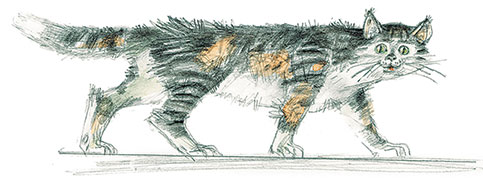
Very smart monkeys
Very interesting case I was in the zoological garden.
One man began to tease the monkeys who were sitting in a cage.
He deliberately pulled out a piece of candy from his pocket and handed it to one monkey. She wanted to take it, but the man didn’t give it to her and hid the candy again.
Then he again held out the candy and again didn’t give it to me. And in addition, he hit the monkey on the paw quite hard.
The monkey got angry - why did they hit it? She stuck her paw out of the cage and at one moment grabbed the hat from the man’s head.
And she began to crush this hat, trample it and tear it with her teeth.
So the man started screaming and calling for the watchman.
And at that moment another monkey grabbed the man by the jacket from behind and did not let go.
Then the man raised a terrible cry. Firstly, he was scared, secondly, he felt sorry for his hat, and thirdly, he was afraid that the monkey would tear his jacket.
And fourthly, he had to go to lunch, but here they wouldn’t let him in.
So he began to scream, and the third monkey stretched out his furry paw from the cage and began to grab him by the hair and nose.
At this point the man was so frightened that he actually screamed in fear.
The watchman came running.
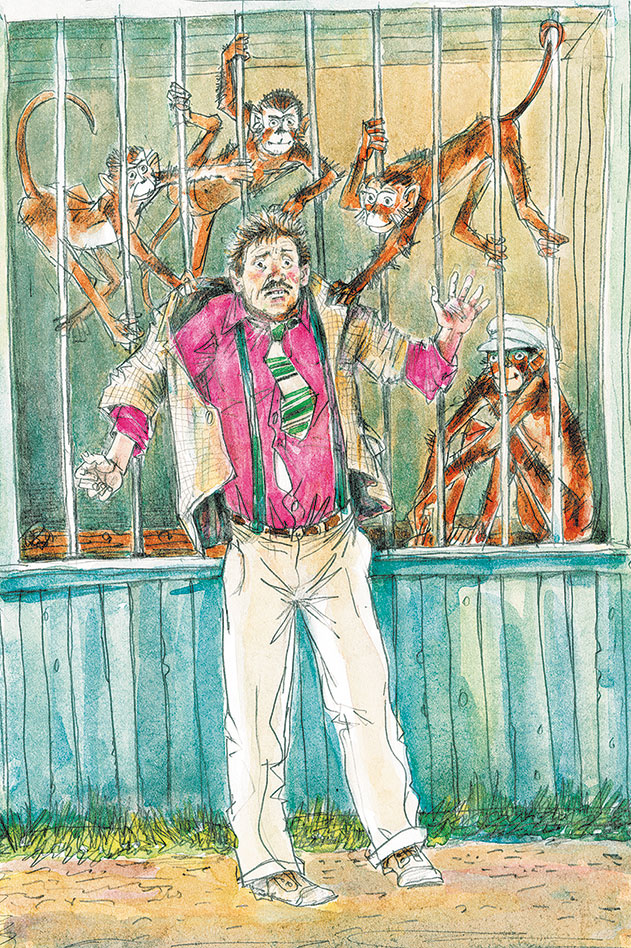
Watchman says:
“Hurry up, take off your jacket and run to the side, otherwise the monkeys will scratch your face or tear off your nose.”
So the man unbuttoned his jacket and instantly jumped out of it.
And the monkey, who was holding him from behind, pulled the jacket into the cage and began to tear it with his teeth. The watchman wants to take this jacket away from her, but she won’t give it back. But then she found candy in her pocket and began to eat it.
Then the other monkeys, seeing the candies, rushed to them and began to eat them too.
Finally, the watchman used a stick to pull the horribly torn hat and torn jacket out of the cage and handed them to the man.
The watchman told him:
– It’s your own fault, why you teased the monkeys. Also be grateful that they didn’t tear your nose off. Otherwise, without a nose, they would have gone to dinner!
So a man put on a torn jacket and a torn and dirty hat and in such a funny manner, to the general laughter of people, he went home to have dinner.
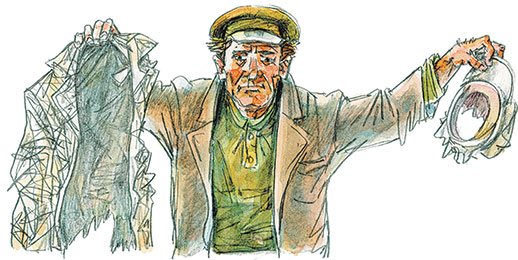
Funny stories
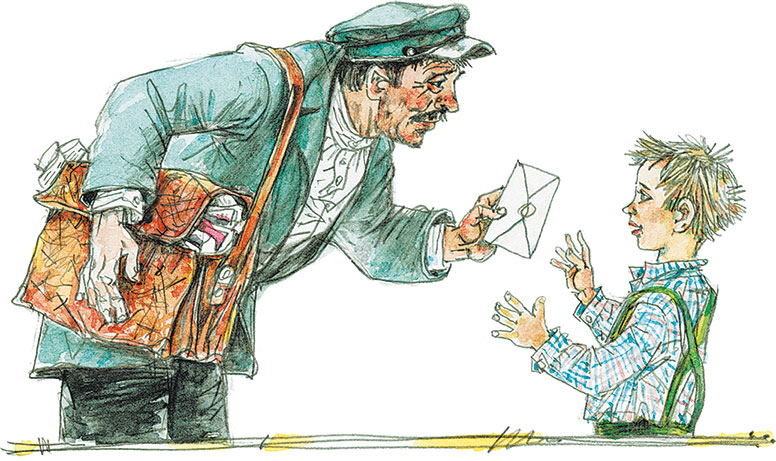
Demonstration child
Lived in Leningrad a little boy Pavlik.
He had a mother. And there was dad. And there was a grandmother.
And in addition, a cat named Bubenchik lived in their apartment.
This morning dad went to work. Mom left too. And Pavlik stayed with his grandmother.
And my grandmother was terribly old. And she loved to sleep in the chair.
So dad left. And mom left. Grandma sat down in a chair. And Pavlik began to play on the floor with his cat. He wanted her to walk on her hind legs. But she didn't want to. And she meowed very pitifully.
Suddenly a bell rang on the stairs.
Grandmother and Pavlik went to open the doors.
It's the postman.
He brought a letter.
Pavlik took the letter and said:
“I’ll tell dad myself.”
The postman has left. Pavlik wanted to play with his cat again. And suddenly he sees that the cat is nowhere to be found.
Pavlik says to his grandmother:
- Grandma, that’s the number - our Bubenchik has disappeared.
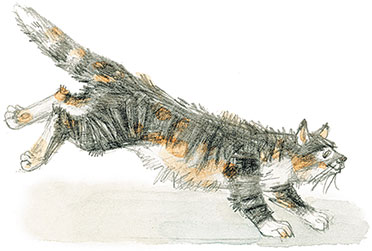
Grandma says:
“Bubenchik probably ran up the stairs when we opened the door for the postman.”
Pavlik says:
- No, it was probably the postman who took my Bubenchik. He probably gave us the letter on purpose and took my trained cat for himself. It was a cunning postman.
Grandmother laughed and said jokingly:
- Tomorrow the postman will come, we will give him this letter and in return we will take our cat back from him.
So the grandmother sat down in a chair and fell asleep.
And Pavlik put on his coat and cap, took the letter and quietly went out onto the stairs.
“It’s better,” he thinks, “I’ll give the letter to the postman now. And now I’d better take my cat from him.”
Here Pavlik went out into the yard. And he sees that there is no postman in the yard.
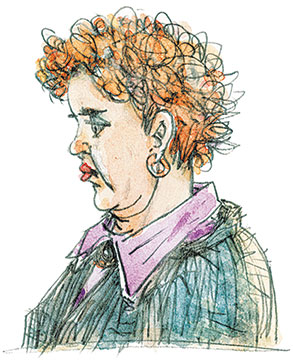
Pavlik went outside. And he walked down the street. And he sees that there is no postman anywhere on the street either.
Suddenly some red-haired woman says:
- Oh, look, everyone, what little baby walking alone down the street! He probably lost his mother and got lost. Oh, call the policeman quickly!
Here comes a policeman with a whistle. His aunt tells him:
- Look at this little boy of about five who got lost.
The policeman says:
- This boy is holding a letter in his pen. This letter probably contains the address where he lives. We will read this address and deliver the child home. It's good that he took the letter with him.
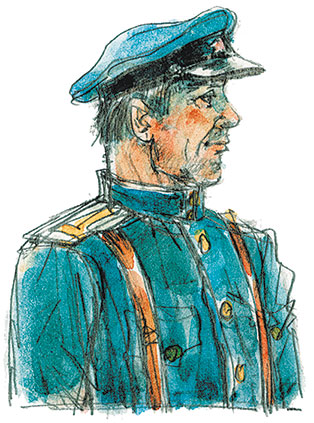
Auntie says:
– In America, many parents deliberately put letters in their children’s pockets so that they don’t get lost.
And with these words, the aunt wants to take a letter from Pavlik. Pavlik tells her:
– Why are you worried? I know where I live.
The aunt was surprised that the boy told her so boldly. And from excitement I almost fell into a puddle.
Then he says:
- Look how lively the boy is. Let him then tell us where he lives.
Pavlik answers:
– Fontanka Street, eight.
The policeman looked at the letter and said:
- Wow, this is a fighting child - he knows where he lives.
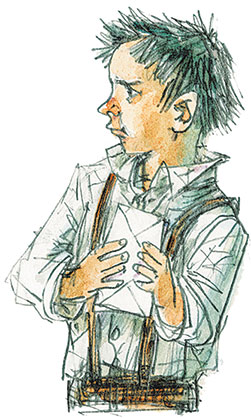
The aunt says to Pavlik:
– What’s your name and who is your dad?
Pavlik says:
- My dad is a driver. Mom went to the store. Grandma is sleeping in a chair. And my name is Pavlik.
The policeman laughed and said:
– This is a fighting, demonstrative child - he knows everything. He'll probably be a police chief when he grows up.
The aunt says to the policeman:
- Take this boy home.
The policeman says to Pavlik:
- Well, little comrade, let's go home.
Pavlik says to the policeman:
“Give me your hand and I’ll take you to my house.” This is my beautiful home.
Here the policeman laughed. And the red-haired aunt laughed too.
The policeman said:
– This is an exceptionally combative, demonstrative child. Not only does he know everything, he also wants to take me home. This child will certainly be the chief of police.
So the policeman gave his hand to Pavlik, and they went home.
As soon as they reached their house, suddenly their mother was walking.
Mom was surprised to see Pavlik walking down the street, picked him up and brought him home.
At home she scolded him a little. She said:
- Oh, you nasty boy, why did you run into the street?
Pavlik said:
– I wanted to take my Bubenchik from the postman.
Otherwise my little bell disappeared, and probably the postman took it.
Mom said:
- What nonsense! Postmen never take cats. There's your little bell sitting on the closet.
Pavlik says:
- That's the number. Look where my trained cat jumped.
Mom says:
“You, nasty boy, must have been tormenting her, so she climbed onto the closet.”
Suddenly grandma woke up.
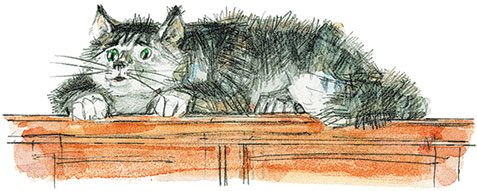
Grandmother, not knowing what happened, says to mother:
– Today Pavlik behaved very quietly and well. And he didn't even wake me up. We should give him candy for this.
Mom says:
“You don’t need to give him candy, but put him in the corner with his nose.” He ran outside today.
Grandma says:
- That's the number.
Suddenly dad comes. Dad wanted to get angry, why did the boy run out into the street? But Pavlik gave dad a letter.
Dad says:
- This letter is not to me, but to my grandmother.
Then she says:
- In the city of Moscow at my youngest daughter another child was born.
Pavlik says:
“Probably a fighting child was born.” And he will probably be the chief of police.
Then everyone laughed and sat down to dinner.
The first course was soup with rice. For the second course - cutlets. For the third there was jelly.
The cat Bubenchik watched Pavlik eat from her closet for a long time. Then I couldn’t stand it and decided to eat a little too.
She jumped from the closet to the chest of drawers, from the chest of drawers to the chair, from the chair to the floor.
And then Pavlik gave her a little soup and a little jelly.
And the cat was very happy with it.
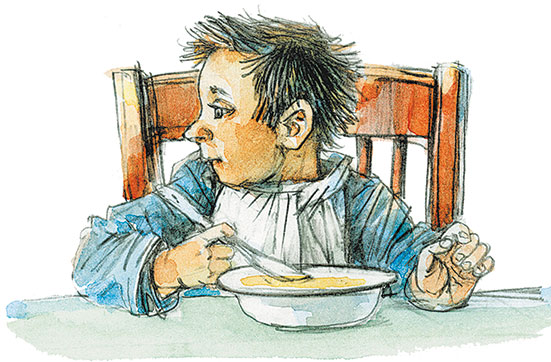
Coward Vasya
Vasya's father was a blacksmith.
He worked in a forge. He made horseshoes, hammers and hatchets there.
And every day he rode to the forge on his horse.
He had, wow, a nice black horse.
He harnessed her to the cart and drove off.
And in the evening he returned.
And his son, a six-year-old boy named Vasya, loved to ride a little.
Father, for example, comes home, gets off the cart, and Vasyutka immediately gets into it and rides all the way to the forest.
And his father, of course, did not allow him to do this.
And the horse didn’t really allow it either. And when Vasyutka climbed into the cart, the horse looked askance at him. And she waved her tail, saying, boy, get off my cart. But Vasya lashed the horse with a rod, and then it was a little painful, and it ran quietly.
Then one evening my father returned home. Vasya immediately climbed into the cart, whipped the horse with a rod and rode out of the yard for a ride. And today he was in a fighting mood - he wanted to ride further.
And so he rides through the woods and whips his black horse so that he runs faster.
Suddenly someone hits Vasya on the back!
Vasyutka jumped up in surprise. He thought that it was his father who caught up with him and whipped him with a rod - why did he leave without asking.
Vasya looked around. He sees that there is no one.
Then he whipped the horse again. But then, for the second time, someone again hits him on the back!
Vasya looked back again. No, he looks, there’s no one there. What miracles are in the sieve?
Vasya thinks:
“Oh, who’s hitting me on the neck if there’s no one around!”
But I must tell you that when Vasya was driving through the forest, a large branch from a tree got into the wheel. She grabbed the wheel tightly. And as soon as the wheel turns around, the branch, of course, slaps Vasya on the back.
But Vasya doesn’t see this. Because it's already dark. And on top of that, he was a little scared. And he didn’t want to look around.
Now the branch hit Vasya for the third time, and he was even more frightened.
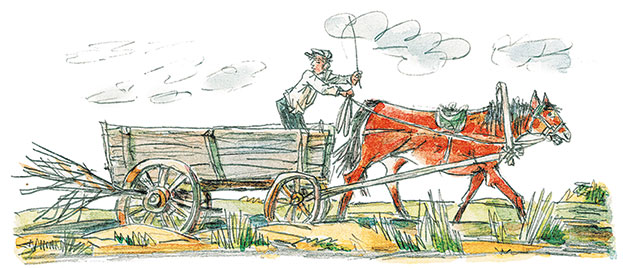
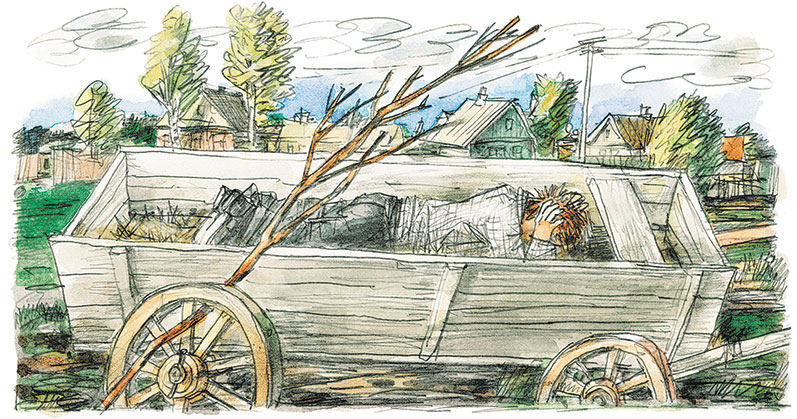
He thinks:
“Oh, maybe the horse is hitting me. Maybe she grabbed the rod with her teeth and, in turn, is whipping me.”
Here he even moved a little away from the horse.
As soon as he moved away, the branch lashed Vasya not on his back, but on the back of his head.
Vasya dropped the reins and started screaming in fear.
And the horse, don’t be a fool, turned back and set off as fast as it could towards the house.
And the wheel will spin even more.
And the branch will begin to whip Vasya even more often.
Here, you know, not only the little ones, but also the big ones can get scared.
Here the horse is galloping. And Vasya lies in the cart and screams with all his might. And the branch hits him - first on the back, then on the legs, then on the back of the head.
Vasya shouts:
- Oh, dad! Oh, mom! The horse is hitting me!
But then suddenly the horse drove up to the house and stopped in the yard.
And Vasyutka is lying in the cart and is afraid to go. He lies there, you know, and doesn’t want to eat.
The father came to unharness the horse. And then Vasyutka crawled off the cart. And then he suddenly saw a branch in the wheel that was hitting him.
Vasya unhooked the branch from the wheel and wanted to hit the horse with this branch. But the father said:
- Stop your stupid habit of beating your horse. She is smarter than you and understands well what she needs to do.
Then Vasya, scratching his back, went home and went to bed.
And at night he had a dream that a horse came to him and said:
“Well, little coward, are you scared? Ugh, what a shame to be a coward.”
In the morning Vasya woke up and went to the river to catch fish.
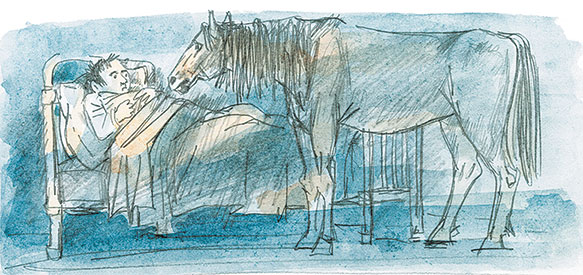
Stupid story
Petya was not such a little boy. He was four years old. But his mother considered him a very tiny child. She spoon-fed him, took him for walks by the hand, and dressed him herself in the morning.
One day Petya woke up in his bed.
And his mother began to dress him.
So she dressed him and put him on his legs near the bed. But Petya suddenly fell.
Mom thought he was being naughty and put him back on his feet. But he fell again.
Mom was surprised and placed it near the crib for the third time. But the child fell again.
Mom got scared and called dad at the service on the phone.
She told dad:
- Come home quickly. Something happened to our boy - he can’t stand on his legs.
So dad comes and says:
- Nonsense. Our boy walks and runs well, and it’s impossible for him to fall.

And he immediately puts the boy on the carpet. The boy wants to go to his toys, but again, for the fourth time, he falls.
Dad says:
- We need to call the doctor quickly. Our boy must have fallen ill. He probably ate too much candy yesterday.
The doctor was called.
A doctor comes in with glasses and a pipe.
The doctor says to Petya:
- What kind of news is this! Why are you falling?
Petya says:
“I don’t know why, but I’m falling a little.”
The doctor says to mom:
- Come on, undress this child, I’ll examine him now.
Mom undressed Petya, and the doctor began to listen to him.
The doctor listened to him through the tube and said:
– The child is completely healthy. And it’s surprising why it falls for you. Come on, put him on again and put him on his feet.
So the mother quickly dresses the boy and puts him on the floor.
And the doctor puts glasses on his nose to better see how the boy falls. As soon as the boy was put on his feet, he suddenly fell again.
The doctor was surprised and said:
- Call the professor. Maybe the professor will figure out why this child is falling.
Dad went to call the professor, and at that moment a little boy Kolya comes to visit Petya.
Kolya looked at Petya, laughed and said:
- And I know why Petya falls down.
Doctor says:
“Look, what a learned little fellow we have found—he knows better than I why children fall.”
Kolya says:
- Look how Petya is dressed. One of his pants legs is hanging loose, and both legs are stuck in the other. That's why he falls.
Here everyone oohed and groaned.
Petya says:
- It was my mother who dressed me.
Doctor says:
- There is no need to call the professor. Now we understand why the child falls.
Mom says:
“In the morning I was in a hurry to cook porridge for him, but now I was very worried, and that’s why I put his pants on so wrong.”
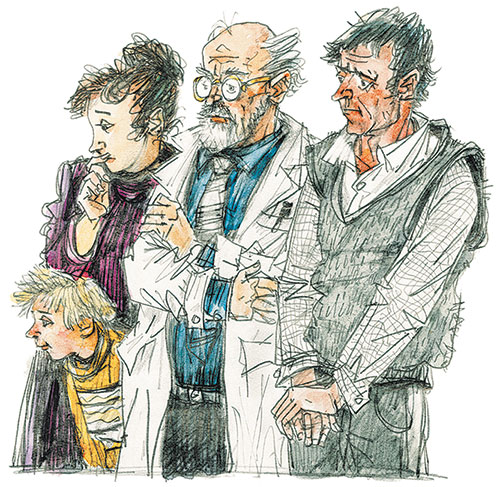
Kolya says:
“But I always dress myself, and such stupid things don’t happen to my legs.” Adults always get things wrong.
Petya says:
“Now I’ll dress myself too.”
Then everyone laughed. And the doctor laughed. He said goodbye to everyone and also said goodbye to Kolya.
And he went about his business.
Dad went to work. Mom went to the kitchen.
And Kolya and Petya remained in the room. And they started playing with toys.
And the next day Petya put on his pants himself, and no more stupid stories happened to him.
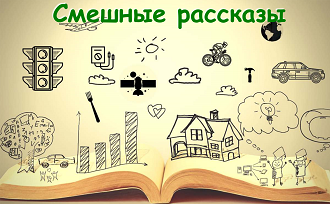
Tormented by nostalgia for childhood, I decided to find the most interesting ones for you funny stories, which I read with pleasure myself as a child.
Demonstration child
Once upon a time there lived a little boy Pavlik in Leningrad. He had a mother. And there was dad. And there was a grandmother.
And in addition, a cat named Bubenchik lived in their apartment.
This morning dad went to work. Mom left too. And Pavlik stayed with his grandmother.
And my grandmother was terribly old. And she loved to sleep in the chair.
So dad left. And mom left. Grandma sat down in a chair. And Pavlik began to play on the floor with his cat. He wanted her to walk on her hind legs. But she didn't want to. And she meowed very pitifully.
Suddenly a bell rang on the stairs.
Grandmother and Pavlik went to open the doors.
It's the postman.
He brought a letter.
Pavlik took the letter and said:
“I’ll tell dad myself.”
The postman has left. Pavlik wanted to play with his cat again. And suddenly he sees that the cat is nowhere to be found.
Pavlik says to his grandmother:
- Grandma, that’s the number - our Bubenchik has disappeared.
Grandma says:
“Bubenchik probably ran up the stairs when we opened the door for the postman.”
Pavlik says:
- No, it was probably the postman who took my Bubenchik. He probably gave us the letter on purpose and took my trained cat for himself. It was a cunning postman.
Grandmother laughed and said jokingly:
- Tomorrow the postman will come, we will give him this letter and in return we will take our cat back from him.
So the grandmother sat down in a chair and fell asleep.
And Pavlik put on his coat and hat, took the letter and quietly went out onto the stairs.
“It’s better,” he thinks, “I’ll give the letter to the postman now. And now I’d better take my cat from him.”
Here Pavlik went out into the yard. And he sees that there is no postman in the yard.
Pavlik went outside. And he walked down the street. And he sees that there is no postman anywhere on the street either.
Suddenly some red-haired lady says:
- Oh, look, everyone, what a little baby is walking alone down the street! He probably lost his mother and got lost. Oh, call the policeman quickly!
Here comes a policeman with a whistle. His aunt tells him:
- Look at this little boy of about five who got lost.
The policeman says:
- This boy is holding a letter in his pen. This letter probably contains the address where he lives. We will read this address and deliver the child home. It's good that he took the letter with him.
Auntie says:
– In America, many parents deliberately put letters in their children’s pockets so that they don’t get lost.
And with these words, the aunt wants to take a letter from Pavlik. Pavlik tells her:
– Why are you worried? I know where I live.
The aunt was surprised that the boy told her so boldly. And from excitement I almost fell into a puddle.
Then he says:
- Look how lively the boy is. Let him then tell us where he lives.
Pavlik answers:
– Fontanka Street, eight.
The policeman looked at the letter and said:
- Wow, this is a fighting child - he knows where he lives.
Auntie says to Pavlik:
– What’s your name and who is your dad?
Pavlik says:
- My dad is a driver. Mom went to the store. Grandma is sleeping in a chair. And my name is Pavlik.
The policeman laughed and said:
– This is a fighting, demonstrative child - he knows everything. He'll probably be a police chief when he grows up.
The aunt says to the policeman:
- Take this boy home.
The policeman says to Pavlik:
- Well, little comrade, let's go home.
Pavlik says to the policeman:
“Give me your hand and I’ll take you to my house.” This is my beautiful home.
Here the policeman laughed. And the red-haired aunt laughed too.
The policeman said:
– This is an exceptionally combative, demonstrative child. Not only does he know everything, he also wants to take me home. This child will certainly be the chief of police.
So the policeman gave his hand to Pavlik, and they went home.
As soon as they reached their house, suddenly their mother was coming.
Mom was surprised to see Pavlik walking down the street, picked him up and brought him home.
At home she scolded him a little. She said:
- Oh, you nasty boy, why did you run into the street?
Pavlik said:
– I wanted to take my Bubenchik from the postman. Otherwise my little bell disappeared, and probably the postman took it.
Mom said:
- What nonsense! Postmen never take cats. There's your little bell sitting on the closet.
Pavlik says:
- That's the number. Look where my trained cat jumped.
Mom says:
“You, nasty boy, must have been tormenting her, so she climbed onto the closet.”
Suddenly grandma woke up.
Grandmother, not knowing what happened, says to mother:
– Today Pavlik behaved very quietly and well. And he didn't even wake me up. We should give him candy for this.
Mom says:
“You don’t need to give him candy, but put him in the corner with his nose.” He ran outside today.
Grandma says:
- That's the number.
Suddenly dad comes. Dad wanted to get angry, why did the boy run out into the street? But Pavlik gave dad a letter.
Dad says:
- This letter is not to me, but to my grandmother.
Then she says:
– In Moscow, my youngest daughter gave birth to another child.
Pavlik says:
– Probably, a fighting child was born. And he will probably be the chief of police.
Then everyone laughed and sat down to dinner.
The first course was soup with rice. For the second course - cutlets. For the third there was jelly.
The cat Bubenchik watched Pavlik eat from her closet for a long time. Then I couldn’t stand it and decided to eat a little too.
She jumped from the closet to the chest of drawers, from the chest of drawers to the chair, from the chair to the floor.
And then Pavlik gave her a little soup and a little jelly.
And the cat was very happy with it.
Stupid story
Petya was not such a little boy. He was four years old. But his mother considered him a very tiny child. She spoon-fed him, took him for walks by the hand, and dressed him herself in the morning.
One day Petya woke up in his bed.
And his mother began to dress him.
So she dressed him and put him on his legs near the bed. But Petya suddenly fell.
Mom thought he was being naughty and put him back on his feet. But he fell again.
Mom was surprised and placed it near the crib for the third time. But the child fell again.
Mom got scared and called dad at the service on the phone.
She told dad:
- Come home quickly. Something happened to our boy - he can’t stand on his legs.
So dad comes and says:
- Nonsense. Our boy walks and runs well, and it’s impossible for him to fall.
And he immediately puts the boy on the carpet. The boy wants to go to his toys, but again, for the fourth time, he falls.
Dad says:
- We need to call the doctor quickly. Our boy must have fallen ill. He probably ate too much candy yesterday.
The doctor was called.
A doctor comes in with glasses and a pipe.
The doctor says to Petya:
- What kind of news is this! Why are you falling?
Petya says:
“I don’t know why, but I’m falling a little.”
The doctor says to mom:
- Come on, undress this child, I’ll examine him now.
Mom undressed Petya, and the doctor began to listen to him.
The doctor listened to him through the tube and said:
– The child is completely healthy. And it’s surprising why it falls for you. Come on, put him on again and put him on his feet.
So the mother quickly dresses the boy and puts him on the floor.
And the doctor puts glasses on his nose to better see how the boy falls. As soon as the boy was put on his feet, he suddenly fell again.
The doctor was surprised and said:
- Call the professor. Maybe the professor will figure out why this child is falling.
Dad went to call the professor, and at that moment a little boy Kolya comes to visit Petya.
Kolya looked at Petya, laughed and said:
- And I know why Petya falls down.
Doctor says:
“Look, what a learned little fellow there is—he knows better than I why children fall.”
Kolya says:
- Look how Petya is dressed. One of his pants legs is hanging loose, and both legs are stuck in the other. That's why he falls.
Here everyone oohed and groaned.
Petya says:
- It was my mother who dressed me.
Doctor says:
- There is no need to call the professor. Now we understand why the child falls.
Mom says:
“In the morning I was in a hurry to cook porridge for him, but now I was very worried, and that’s why I put his pants on so wrong.”
Kolya says:
“But I always dress myself, and such stupid things don’t happen to my legs.” Adults always get things wrong.
Petya says:
“Now I’ll dress myself too.”
Then everyone laughed. And the doctor laughed. He said goodbye to everyone and also said goodbye to Kolya. And he went about his business.
Dad went to work. Mom went to the kitchen.
And Kolya and Petya remained in the room. And they started playing with toys.
And the next day Petya put on his pants himself, and no more stupid stories happened to him.
I am not guilty
We sit at the table and eat pancakes.
Suddenly my father takes my plate and starts eating my pancakes. I'm crying.
Father with glasses. He looks serious. Beard. Nevertheless, he laughs. He says:
– You see how greedy he is. He feels sorry for one pancake for his father.
I speak:
- One pancake, please eat. I thought you would eat everything.
They bring soup. I speak:
- Dad, do you want my soup?
Dad says:
- No, I’ll wait until they bring the sweets. Now, if you give me something sweet, then you are really a good boy.
Thinking that cranberry jelly with milk for dessert, I say:
- Please. You can eat my sweets.
Suddenly they bring a cream that I am partial to.
Pushing my saucer of cream towards my father, I say:
- Please eat, if you are so greedy.
The father frowns and leaves the table.
Mother says:
- Go to your father and ask for forgiveness.
I speak:
- I will not go. I am not guilty.
I leave the table without touching the sweets.
In the evening, when I am lying in bed, my father comes up. He has my saucer with cream in his hands.
Father says:
- Well, why didn’t you eat your cream?
I speak:
- Dad, let's eat it in half. Why should we quarrel over this?
My father kisses me and spoon-feeds me cream.
© Zoshchenko M. M., heirs, 1940 – 1956
© Gumenyuk M., illustrations, 2003
© Akimov V., preface, 2003
© Series design, compilation. Publishing house "Children's Literature", 2003
Childhood is the beginning of destiny
(About children's stories by Mikhail Zoshchenko)
Mikhail Mikhailovich Zoshchenko is better known as an “adult” writer. But when you read this book, you will see that he is also wonderful children's writer. Special. Unique. It seems that all his life - and the further, the more - he returned to youth, childhood. And his last, most significant works for “adults”, written in his middle age, were called: “Youth Restored”, “Before Sunrise”, “Before Sunrise...” - that is, at the dawn of life, when everything is ahead, and the air is especially clean and transparent.
For Zoshchenko, childhood is a kind of choice of path: where and how will a person go? Who and what will be his guide in this short and eternal, vulnerable and impressionable state?
Childhood is unique in every destiny. How to preserve this uniqueness? Not to be destroyed by the violence of the environment, the temptations of life, its coercion?!
... Zoshchenko loved children, was especially open and trusting with them. M. Mukhranskaya, who knew Mikhail Mikhailovich closely at the end of his life, recalled: “He liked to be with children. He felt at ease in their company. After all, unlike adults, children have not yet learned to hide their feelings and say what they think.<…>I recently asked my son: “How do you remember him?” And he, without hesitation, answered: “Happy!” Let me add that I was familiar with M. Mukhranskaya. It happened that our conversations turned into her memories of Zoshchenko - and I have no doubt at all about her sincerity and observation.
Moreover, the well-known satirist Zoshchenko was not so much a depicter of contortions human life, a mocker, how much - compassionate. “I don’t have hatred for anyone - that’s my exact ideology,” he said at the very beginning of his literary life. And he remained that way forever. He does not “brand” “negative” characters, but strives to open people’s eyes to themselves; this is the desire to help, to protect a person from violence, evil around and in himself. In those difficult years When Zoshchenko was doing his job in literature, people especially needed such a feeling as a writer.
...And Zoshchenko’s pure children’s stories, most of which were written in the late 1930s (and this was also a difficult, cruel time), became for him and his readers a spiritual salvation from lies, violence, from the imposed illusions of a “happy” life and a breakthrough to true life. To children's life. And several more stories written after the war, in essence, were also a need to understand what? happened in the souls of people, in the souls children's. And the desire to help people who survived the war. The serious wounds of war, the writer was sure, must be treated with kindness, attention, and compassion. And it’s true.
Korney Ivanovich Chukovsky in ancient years, when Zoshchenko was young, spoke about him: “A great man.”
But he added: “His insanity is self-medication.” Here it would be necessary, as time has shown, to replace the words “insanity” and “self-medication” with the words “conviction” and “self-improvement.” Yes, Zoshchenko was convinced that self-improvement is both a duty and a human right.
This is, in fact, what Zoshchenko’s children’s stories are about. Not all of them will be discussed here, but the most significant ones, of course, we will not forget.
Let's start with the cycle “Lelya and Minka”. Eight stories about the childhood of a sister and brother. Essentially autobiographical stories. ABOUT his childhood. And they start with main idea: “Don’t lie” (that’s the title of the first story).
By chance, a seven-year-old first-grader at the gymnasium did not memorize the poem assigned for home. And then, as luck would have it, the teacher called him. And he - at the promptings of others, deliberately confusing - began to say absurd things. The teacher gave him a grade - the first in his life. Since this all started. On the advice of nine-year-old Lelya, he wanted to hide this unit. And he does this once, and twice, and three times: now forgetting the diary on a street bench, now throwing it behind a closet, now taping up the page... But everything, of course, becomes clear. And he himself, unable to bear the lies, tells his father how everything really happened.
This is where, if you think about it, the main thing happens. It's not about the unit. And the fact is that you can’t mindlessly obey someone else’s will, you can’t live according to a prompt. Any! And second: no matter how you hide the truth, it will still come out (according to the saying: “You can’t hide an awl in a sack”). And it hurts. Remember your father’s words: “People who lie are funny and comical” (by the way, isn’t this the comedy of many of Zoshchenko’s “adult” stories – about people who, voluntarily or unwittingly, fall into self-deception).
And, having become an adult, Minka recalls: “...I was ashamed of his (father. - Auto.) quiet words." That's it: the real truth it is spoken in quiet words, from the soul, there is no need to shout about it at the top of your voice. And to be yourself means to live not according to a hint. Every lie hurts the conscience. And even after going through purification with the truth, my soul is still bitter and painful.
And I really... always do that.
Ah, sometimes it can be very difficult, but my heart is cheerful and calm.”
Well said, isn't it?!
The next story also makes you sad and think for a long time. This is Galoshes and Ice Cream. Open before us again mental wound: the author is painful and ashamed to remember how often a person is ready to obey his whim (for example, for the sake of a scoop of delicious ice cream, he gives his guests’ galoshes to a junk dealer). And then comes repentance that haunts you all your life. It turns out that “sweet” memories can be very bitter.
But don’t think that Zoshchenko is torturing us with his stories. When you read these stories, including “Galoshes and Ice Cream,” especially out loud, they make you not only empathize, but sometimes laugh uncontrollably. Good laughter relieves tension and helps to see a simple and bright path to another person. And to myself.
The continuation of a similar story about gifts in the story “Thirty Years Later” is both amusing and sad at the same time.
...And you also need to be careful with free “finds”. This is stated in the story, which is called “Nakhodka”. Once upon a time in childhood, Minka and Lyolya played a prank on a passerby by slipping him a beautifully wrapped candy box, and inside it - a frog and a spider. Then, many years later, the same mischievous people pulled a similar prank on Minka himself. "Guys! “Everything passes in life,” exclaims the matured Minka. And nothing passes - everything leaves marks in the soul, in the memory...
Take a closer look at the father of our little heroes - one of the main characters in the stories. His lesson in the story “Yolka” is especially memorable. There, as you remember, Lelya and Minka, without waiting for the guests, feasted on Christmas tree. And when the time comes to distribute gifts to the little guests, it turns out that an apple has been bitten, a doll’s hand has been broken off... The father punishes the children. They have a lesson for life - not to take what belongs to others and not to offend the weak.
This is it main lesson father. Truth is the path to yourself, to kindness and love in the soul of every person. You cannot close your eyes if, having succumbed to temptation, you have forgotten about other people. And dad says: “This kind of upbringing is ruining my children. I don't want my children to be greedy and evil. And I don’t want them to fight, quarrel and kick out guests. It will be difficult for them to live in the world, and they will die alone.” Deep meaning contained in these words. AND real fate Lelya and Minka’s generations (remember – ZOSCHENKO’s generations!) developed in such a way that they were doomed to loneliness the best People. This is what gave birth to the spirit of resistance in Zoshchenko’s life and writings.
We read the story “Great Travelers” with great interest. How thoughtlessly children of five to seven years old go to trip around the world! Adventure awaits them at every step. And there is no end to them. Only the instinct of self-preservation helps to get out of this very dangerous adventure. Out of ignorance, it turns out, you can mess up so much (and even pay with your own head)! As you finish reading this amusing, fascinating story, you think about our entire country, in which you can also get lost, like in a dark forest.
And finally, the story “Golden Words”, which completes these “memoirs of childhood.”
Apparently, it is not by chance that it was placed after “The Great Travelers”. What are we talking about? Dad says: “Everything must be done taking into account the changed situation.” At first glance, everything is reasonable and understandable. This is another lesson learned from life. And it seems to me that the lesson is sad. Here comes Zoshchenko, the narrator, moving on to his writing work, also speaks about adaptation to the “changed situation”: “In my work, for example, I learned from the old great masters.<…>But I saw that the situation had changed. Life and the public are no longer what they were when they were there. And that's why I didn't imitate their rules.<…>And maybe that’s why I became a relatively happy person...”
Sad, sad... Or maybe it was worth “imitating”? Or is the violence of the “changed situation” over human soul? Meanwhile, the “old magnificent masters” had a different opinion - re-read Pushkin, Gogol, Dostoevsky, Leo Tolstoy... And the writer Zoshchenko himself understands that the truly “golden words” are different. The end of the story is sad, but courageous: “... back in ancient times, one a wise man(who was being led to execution) said: “No one can be called happy before his death.”
These were also “golden words”.
...Here you go children's stories! It turns out that according to Zoshchenko, starting life, already need to know what you're getting into. And until the whole path is completed, do not say whether he was happy or not.
Apparently, these stories need to be reread at all ages - from a five-year-old, Minkin, to an elderly, grandma.
...Before us are several more Zoshchenko stories about childhood. But about another childhood, not about my own. And then it turns out that the deepest truths of childhood do not change.
Let's reread these stories.
Here's "Stupid Story". This story is not only for children. It's for adults too. Four-year-old Petya’s mother “considered... a very tiny child. She spoon-fed him, took him for walks by the hand, and dressed him herself in the morning.” And it ended with a stupid story: while getting dressed, she put both of his legs into one pant. And I didn’t notice it. Petya began to fall - unexpectedly for the adults. They call the doctor and cause a commotion. But then the neighbor boy Kolya, Petya’s friend, comes and explains everything to the adults. Like this! Let this be a lesson to them! Don't take away your children's independence. Let them be full-fledged people at their age, don’t “childish” them - they themselves can do a lot! Kolya’s words are magnificent: “I always dress myself, such stupid things don’t happen to my legs.” That's it: don't take away children's rights. stand on your own feet. It’s enough for a child to be a puppet even in the most caring hands. (And here another consideration arises: maybe there is more narcissism in this maternal care? They say, look, this is what I am! Without me, Petya can’t and shouldn’t do anything.)
Such care literally “binds” childhood. No, Petya myself Maybe. Myself must. And then no stupid stories will happen to him.
But, of course, you need to know and be able to do a lot - this is what the story “The Most Important Thing,” written in 1939, is about. His first phrase: “Once upon a time there lived a boy...” That’s right: starting from childhood, we live in the world. And there is nothing richer, more complex and more difficult than this light. And more beautiful than him. But to enter this light, you need education. Life in the world tests a person all the time. You can declare: “I am not afraid!” This is not enough. Need more be able to Do not be scared. But this is not enough. “And whoever is smart must be brave...” If you think about it, what depth and what pain stands behind these words! How many were there in those Zoshchenko years? smart people! And even today there are enough of them. And here courage living in truth, in conscience, is lacking for many - this is the subtext in this children's story.
And as if a continuation of this thought about the ability to live in the world is the story “An Indicative Child.” Little Pavlik has excellent self-control and intelligence. Remember, when his cat disappeared during the postman's arrival, the boy showed miracles of determination. The reader has an unexpected question: isn’t Pavlik too independent and self-confident? Doesn't it seem that it was his self-confidence that caused the confusion and turmoil?
Let's go back to the beginning of the story: the parents went about their business, and the old grandmother fell asleep in the chair... So. What is Pavlik doing? And he “began to play on the floor with his cat. He wanted her to walk on her hind legs. But she didn't want to. And she meowed very pitifully.”
This is where the doorbell rings. And he was a savior for cats. While Pavlik went to receive the letter, she hid from her torturer. That's the whole solution. Dear Pavlik! Don't torture the cat! The cat is also alive. Of course, it’s good to be decisive, courageous, and someone who argues! But you need to think about others too. Even about the cat. That's what the story "Exemplary Child" is about.
This is exactly what the story “Smart Tamara” claims. It also talks about a cat. A cat's meowing was suddenly heard from the empty apartment where the engineer had gone on vacation. What is it - the owner forgot about his cat? No, she accidentally entered his apartment through the window. And then the residents decided: the cat needs to be fed, but smart Tamara suggests how. Everyone took care of the cat together. It was important for them to save her life.
And “Vasya the Coward” is also about the relationship between man and animal. That's what it's all about. Vasya loves to ride in a cart. He’ll sit down and urge the horse with a twig! And you have to pay for pleasure - this is the ironic meaning of the story. Do you like to ride a horse, lashing it with a branch? Well, get back...
Do you feel sorry for Vasya? Yes. But not because he himself was being painfully whipped by a branch that got into the wheel. Therefore, it’s a pity that he is not used to thinking about either the horse or what grows on the forest road. He thinks only about his own pleasure. Intuitively, Vasya understands that he is being unfair to the horse, that he is offending it. And here is his punishment. How else can one explain that he so patiently endures a kind of flogging, which is carried out by an invisible branch that has gotten into the wheel?
So, maybe the lesson will not be in vain for him? Well, let's see. At least the next morning Vasya went “fishing” and changed his occupation.
This work ends the cycle of Zoshchenko's pre-war stories about children. Soon all the people will “change their occupation” - it will come terrible war. There are also several children's stories about her. They are very different, although they were written almost at the same time - in the first year after the end of the war.
So what is the first one about - “ Interesting story"? It’s not just about the fact that during the war, when retreating, people hid things, buried them in the ground, and then, who returned, dug them up. And it’s not even about the fact that Kolya Sokolov grew up during this time and his steps became wider (that’s why he didn’t immediately “go out” to his buried box).
What is he talking about? That it's a shame when the enemy walks across your land, that, returning to your native village, you involuntarily experience its suffering. And this excitement does not immediately allow Kolya to figure out how many steps he needs to take to reach the box he buried. Reading the story, we vaguely feel this excitement; it's hard to imagine what I went through motherland without Kolya, without his front-line soldier father, fellow villagers...
Maybe this is what makes “An Interesting Story” truly interesting.
But everything ended well. And things were found. And Colin’s father returned from the war with a medal for bravery. And he praised Kolya... And we think (and Zoshchenko himself, of course): yes, they were lucky. What about others, like the entire people, like those whose homes were destroyed, whose fathers did not return from the war?..
The story “Poor Fedya” is just about a boy who bad luck.
Orphanage. Fedya, an orphan, cannot read at the age of ten. The war took away from him native word. She took the house. He is lonely, sad... They took him to the doctor. But here medicine is powerless. Fedya needs other treatment.
Zoshchenko has his own view on Fedya’s return to daily life. Fedya must at least smile in the end. By the way, the doctor says the same thing.
However, the boy does not respond with a smile to all the tricks of the guys around him. “And then the children thought that he would never be healthy, since he couldn’t laugh.”
But healing was still possible. One woman who came to see her son, when looking at the sad Fedya, awakened a maternal feeling for him. And she “involuntarily approached him and said...”. Unwittingly! Her emotional impulse became the most the best treatment: she invited Fedya to her house! And Fedya smiled for the first time. This struck the woman even more deeply: “And if you want, I will be your mother.” And then everyone saw that Fedya smiled a second time and quietly said: “Yes, I want to.”
This was Fedya’s salvation from the most terrible disease that became widespread in those years - human homelessness and loneliness.
But in general the tone of the story, despite a happy ending, not very funny. And this can be understood. But Zoshchenko is not to blame for this...
And let it not seem strange that a monkey evaluates the world and what is happening in it in its own way. Both good and evil.
Behind this plot is, of course, the writer Zoshchenko himself - attentive, compassionate, depressed by what is happening to his compatriots. And the monkey is also a “compatriot,” for “man looks into nature as into a mirror” (Mikhail Prishvin).
Yes, once upon a time the monkey lived a calmer life in the zoo than in its current “freedom.” In “freedom” she learned a lot of new things: scary and difficult, but also joyful. The monkey felt care, kindness, protection, which no cage in a zoo could provide.
Running away from the crowd that was catching her, from the evil toothy dog, she jumps over the fence behind which the teenager Alyosha Popov was chopping wood.
Having met him, the monkey seemed to have found himself - no, not in a zoo cage, but in native home: protected, fed, loved...
But, as we see, people meet on her path are different. For example, the disabled Gavrilych is ready to sell a monkey so that with the money he can “drink ten glasses of beer in a row.” And the crowd, at first, was also not overcome with the best feelings.
But the ending of the story is encouraging. Alyosha Popov finds the monkey again. The driver, who was the first to take care of the homeless monkey, hands it over to Alyosha: “I will give the monkey to the one who holds it so lovingly in his hands...” And by the way, we note that this kind movement of the soul is also transmitted to the people around him (this is no longer a crowd!): “And then the whole audience clapped their hands.” The humor of the finale is both reassuring and demanding in its own way: people must be able to be human (“take an example” from a monkey, Zoshchenko jokes).
Once Guy de Maupassant, classic French literature, called the happiest writers those whom children read.
Therefore, let's say: happy writer Mikhail Zoshchenko!
V. Akimov
Smart animals
They say that elephants and monkeys are very smart animals.
But other animals are not stupid either. Look what smart animals I saw.
Smart goose
One goose was walking in the yard and found a dry crust of bread.
So the goose began to peck at this crust with its beak in order to break it and eat it. But the crust was very dry. And the goose could not break it. But the goose didn’t dare swallow the whole crust right away, because it probably wouldn’t be good for the goose’s health.
Then I wanted to break this crust so that it would be easier for the goose to eat. But the goose did not allow me to touch its crust. He probably thought that I wanted to eat it myself.
Then I stepped aside and watched what would happen next.
Suddenly the goose takes this crust with its beak and goes to the puddle.
He puts this crust in the puddle. The crust is made soft in water. And then the goose eats it with pleasure.
It was a smart goose. But the fact that he didn't let me break the crust shows that he wasn't all that smart. Not exactly a fool, but he was still a little behind in his mental development.

